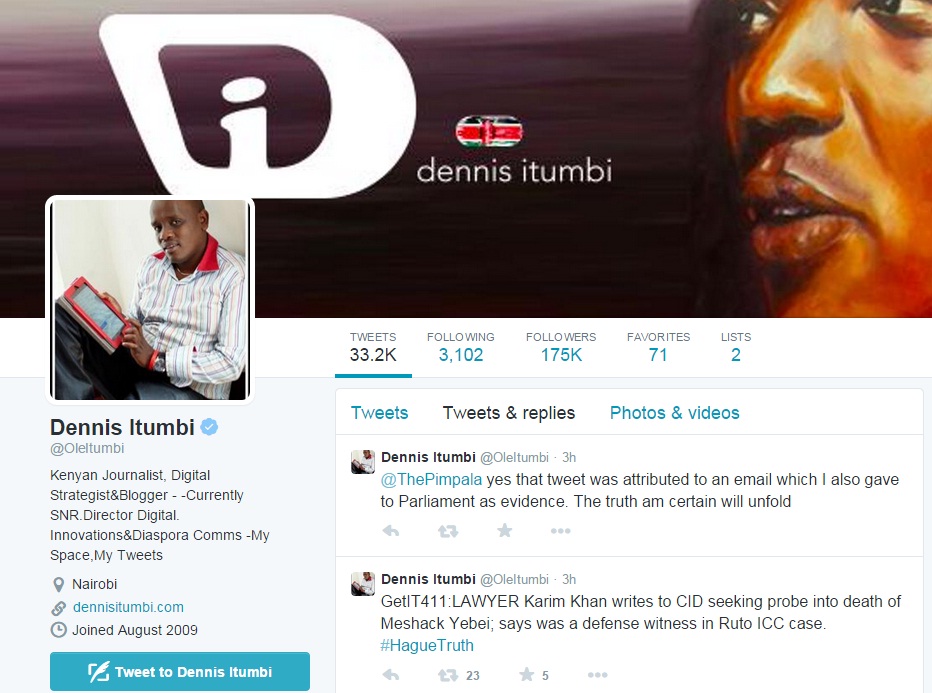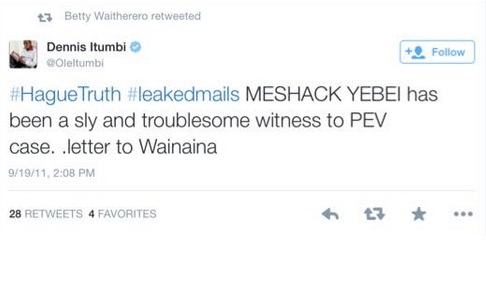Social Media in the Public Service: Can Public Officers Express Personal Opinions Online?
- Victor Nzomo |
- January 5, 2015 |
- CIPIT Insights,
- Social Media and the Law

The answer to this question is simply: it depends. A good way to unpack this question is to use a live example, say one Dennis Itumbi. For those who do not know Itumbi, a quick google search reveals that Dennis Ole Itumbi is the Director of Digital Communication in the Office of the President of the Republic of Kenya. Therefore, by all accounts, Itumbi is a public officer/state officer as defined in the Constitution as well as several pieces of legislation. For good measure, Itumbi’s twitter bio reads in part: “Currently SNR.Director Digital. Innovations&Diaspora Comms”
In 2013 when President Uhuru Kenyatta come into office, he announced his intent to overhaul how the Presidency communicates and interacts with citizens by establishing the Presidential Strategic Communications Unit (PSCU) to replace the Presidential Press Service (PPS). The PSCU is charged with covering the President of the Republic, the First Lady of the Republic along with research on policy, communication of government policy, digitisation of government communications and branding State events and functions. Itumbi was appointed to his current position (as indicated in his twitter bio) along with four other directors all running various departments within the PSCU, which is headed by a Secretary of Communications who is also the State House Spokesman.
In a recent article by Prof. Makau Mutua titled “It’s unfortunate that abuse of social media extends to state authorities”, he accuses Itumbi of using social media to castigate and vilify critics of the Presidency. Makau personally calls out Itumbi for using social media as a weapon of propaganda against the people, especially those who seek to hold the government accountable. In this regard, Prof. Mutua states:
“One Dennis ole Itumbi, the so-called Director of Digital Communication in the Office of the President, uses his platform to vilify Jubilee critics and civil society. He can’t express “personal” views on social media because the line between the public and the private doesn’t exist for such an official of his status. Kenyan taxpayers buy his ugali and sukumawiki [food]. Neither he, nor any senior official within the state, should castigate critics on social media.”
While Mutua may have his personal reasons for singling Itumbi out in his popular weekly newspaper column, his article raises several interesting issues for enthusiasts of social media and the law. After disclosing his position as a public officer serving in the Executive, the final part of Itumbi’s bio reads: “My Space,My Tweets”. Presumably these words are meant to serve as a disclaimer similar to those found on most twitter bios, such as “Views Are My Own” and “Retweets are not endorsements”. This blogger opines that such twitter disclaimers offer as much false sense of protection from legal liability as the words “no copyright intended” written by users of YouTube when they upload artists’ songs and videos without the latter’s consent. The truth of the matter is that these widely used legal-sounding, bite-sized expressions are not fully understood by social media users vis-a-vis the real legal ramifications of their actions such as uploading, posting and sharing of content on social media.

In a previous blogpost here, we discussed the extent to which the law regulates the use of social media by public officers. Looking forward, this blogger would recommend the following: guidelines on social media for public servants, a social media policy for the Public Service and social media training for public servants.
In the case of Itumbi whose salary is paid by the Kenyan tax-payer, this blogger submits that the State would be well within the law to fire or reprimand Itumbi for any tweets published from his twitter account if such tweets are deemed to fall foul of his position in public service. Equally, there is a real likelihood that the State may be exposed to vicarious liability for any tweets by Itumbi that threaten to infringe or infringe on the constitutional and legal rights of any citizen of Kenya.
